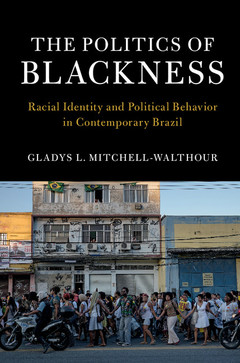Description
The Politics of Blackness
Racial Identity and Political Behavior in Contemporary Brazil
Cambridge Studies in Stratification Economics: Economics and Social Identity Series
Author: Mitchell-Walthour Gladys L.
This book examines Afro-Brazilian individual and group identity and political behavior, and develops a theory of racial spatiality of Afro-Brazilian underrepresentation.
Language: English
Subject for The Politics of Blackness:
The Politics of Blackness
Publication date: 12-2017
282 p. · 15.2x22.8 cm · Paperback
Publication date: 12-2017
282 p. · 15.2x22.8 cm · Paperback
Approximative price 82.73 €
In Print (Delivery period: 14 days).
Add to cart
The Politics of Blackness
Publication date: 12-2017
282 p. · 15.8x23.6 cm · Hardback
Publication date: 12-2017
282 p. · 15.8x23.6 cm · Hardback
Description
/li>Contents
/li>Biography
/li>
This book uses an intersectional approach to analyze the impact of the experience of race on Afro-Brazilian political behavior in the cities of Salvador, São Paulo, and Rio de Janeiro. Using a theoretical framework that takes into account racial group attachment and the experience of racial discrimination, it seeks to explain Afro-Brazilian political behavior with a focus on affirmative action policy and Law 10.639 (requiring that African and Afro-Brazilian history be taught in schools). It fills an important gap in studies of Afro-Brazilian underrepresentation by using an intersectional framework to examine the perspectives of everyday citizens. The book will be an important reference for scholars and students interested in the issue of racial politics in Latin America and beyond.
Introduction; 1. Afro-Brazilian political underrepresentation; 2. Blackness and racial identification in contemporary Brazil; 3. Negro group attachment in Brazil; 4. Negro linked fate and racial policies; 5. Afro-descendant perceptions of discrimination and support for affirmative action.
Gladys Mitchell-Walthour is a Political Scientist in the Department of Africology at the University of Wisconsin, Milwaukee. She was the 2013–2014 Lemann Visiting Scholar at the David Rockefeller Center for Latin American Studies at Harvard University. In 2016, she was elected the Vice President of the Brazil Studies Association. She has co-edited both Race and the Politics of Knowledge Production: Diaspora and Black Transnational Scholarship in the United States and Brazil (2016) and Brazil's New Racial Politics (2010).
© 2024 LAVOISIER S.A.S.




